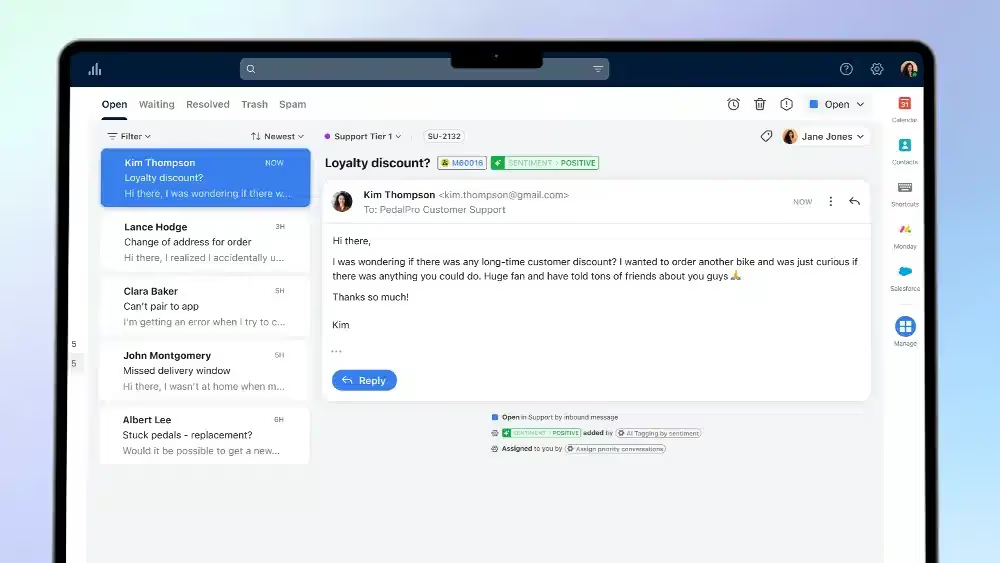
Credit: front.com (edited)
While AI erodes the traditional support role, the pillars of great CS are only getting stronger
Key points
- AI in customer service should empower teams and build trust, not just cut costs or deflect tickets.
- Kenji Hayward of Front discusses the importance of a solid support foundation before integrating AI in CS.
- AI should complement support teams, enhancing their capabilities rather than replacing them.
You still have to have a really good support foundation. If you can complement that with good AI, then that’s a really good experience. If you think that you can just throw AI at it and everything is going to go away, that's not the case today.
Although AI is still in its infancy and barely scratching the surface of its potential adoption, it's hard to ignore the delta between low hanging fruit and sustainable use cases. Most enterprise-grade engineers have quickly matured beyond chasing the latest models and application-level wrappers. The exposure and risk are just too high and unpredictable compared to more deterministic integrated tech innovations of the past.
Specifically in customer service implementations, using AI to cut headcount or deflect tickets is a misstep (at best). The true power lies in empowering teams, building trust, and delivering sharper, more thoughtful service. That takes more than automation—it takes intention.
Kenji Hayward, Senior Director of Customer Support at Front and author of the Top-Tier Support newsletter, wants AI to make support teams stronger, not sidelined. But it’s a careful balance, and he also warns against rushing deployments that cut corners and undermine customer confidence.
No shortcuts allowed: For Hayward, AI only works if the foundation is solid. "You still have to have a really good support foundation," he explains. "If you can complement that with good AI, then that’s a really good experience." But the quality of that experience hinges on intention and strategy. "If you think that you can just throw AI at it and everything is going to go away, that's not the case today."
Hold your horses: It can be easy to misinterpret what "AI first" means, Hayward warns. "Businesses are getting too excited about putting AI in front of the customer. And that's not what 'AI first' means." Hayward sees too many teams rushing to roll out bots without the right setup. "We're seeing a decline in customer satisfaction as companies put the cart before the horse," he warns. That's why he stresses equal standards across the board. "I have the same, if not more, scrutiny for my AI than my human agents," explains Hayward.
AI as a sidekick: AI isn't the hero. Support teams are. "You built your team today in a way that you envisioned," Hayward says. "You have to look for places where you can give your team superpowers." It's about leveraging tech to complement and enhance an already-outstanding team. That means streamlining knowledge, saving time, and unlocking space for real human connections, not just tossing in tech for tech's sake.
You built your team today in a way that you envisioned. You have to look for places where you can give your team superpowers.
Kill the old metrics: Handle time doesn't mean much when AI answers in seconds. "We should start seeing the evolution of metrics pretty shortly," Hayward says. Legacy KPIs like CSAT still work for human agents, but AI needs a different lens. That's why he relies on updated KPIs like the AI Experience Impact Score (AXIS), blending key aspects of longstanding KPIs to measure what matters in bot performance.
"I think inferred-by-AI is the direction," he says. Inferred analytics will reshape how success is measured. "That's going to be the new skin on all metrics," says Hayward. "But then we're going to take it a step further and create new ones."
AI architects: "Your strategy cannot just be deflecting and swatting," Hayward says. Quick fixes? Sure, give those to AI. "If it's a faster, good experience, obviously deflect that way." But support teams are now playing a bigger role: designing the AI experience itself. "They're the architects of the AI experience," he explains. They're moving from ticket-takers to support strategists.
Support glow-up: More than simply solving problems, support is becoming a real revenue driver. Hayward shares how Front is exploring "inferred upsells," where AI spots unmet needs and nudges reps to make the right recommendation. AI also flags churn risks, fast. "Sentiment analysis" can spot frustration in seconds, giving teams time to jump in and save the relationship.
"The traditional support role as we know it today is probably going away," Hayward says. "But it doesn't mean support's going away." In fact, it's becoming more valuable thanks to a sharper focus on strategy, trust, and the human edge that AI can’t replace.



